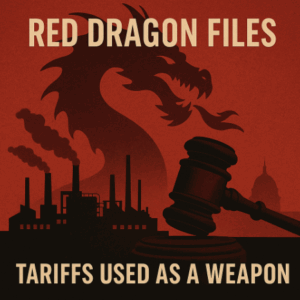 Tariffs, Power, and Politics: Undermining America’s Industrial Revival
Tariffs, Power, and Politics: Undermining America’s Industrial Revival
by Michael Stevens
How political obstruction of presidential authority is weakening our economy—and helping China
The Constitution isn’t vague on this. Congress sets the rules, and the President enforces them. That includes trade policy. For decades, Congress has legally delegated tariff authority to the executive branch, allowing it to act swiftly in the national interest. But now, that delegation is under siege—not by the courts, not by foreign adversaries, but by Democrats more interested in hurting Trump than helping the country.
President Trump’s use of targeted tariffs to rebuild American manufacturing is lawful, constitutional, and strategically sound. The statutes are on the books. The courts have upheld them. The only thing standing in the way now is political sabotage, and the damage is real.
The Law Is on Trump’s Side
Congress passed the Trade Expansion Act of 1962 and the Trade Act of 1974 to give Presidents the tools to respond to national security threats and unfair foreign trade practices. These statutes have what courts call an “intelligible principle”—a clear standard for action.
Trump used these powers to impose tariffs on steel, aluminum, and Chinese goods. He did so after formal investigations and national security findings. And he did so within the bounds of the law.
The courts have consistently backed him up:
- J.W. Hampton (1928): A Congressional delegation is valid if it contains clear guidelines.
- Algonquin (1976): The President can impose import restrictions under §232.
- AIIS v. U.S. (2020): Trump’s tariffs were upheld as constitutional.
There’s no gray area here. The legal ground is solid. The only challenge is political.
Democrats Know This—And They’re Undermining It Anyway
This isn’t about legality. It’s about hatred—hatred of Trump. Every lawsuit, delay, or procedural stunt to stop his tariff strategy comes from one place: political vendetta.
And it’s not just Trump who suffers. It’s every American factory. Every supply chain. Every worker. Business owners don’t know what rules will stick. Investors don’t know whether to build. This creates instability, hesitation, and a chilling effect across industries.
Meanwhile, China watches. They understand the power of industrial dominance. Their Belt and Road strategy is about locking down ports, minerals, and infrastructure. They don’t care about political theater. They care about winning.
America Used to Understand This
We didn’t win two world wars with consultants and call centers. We won with iron, oil, rail, and resolve. A strong industrial base isn’t nostalgic—it’s necessary. It’s the bedrock of national security and strategic independence.
President Trump gets this. His policies reflect it. But the Democratic Party would rather burn down the factory to spite the foreman.
In the 1940s, Detroit could switch from building sedans to bombers in a matter of days. Today, we have become dependent on overseas suppliers for chips, metals, and even pharmaceuticals. That’s the cost of abandoning manufacturing, and Trump’s tariff push is one of the few efforts in decades to reverse that trend. It is a matter of national defense and national security.
The fight isn’t just about economics. It’s about capacity. If you can’t make it, you can’t fight with it. That’s the hard truth most of D.C. seems to have forgotten.
A Dangerous Game, Played at Our Expense
Undermining a President’s lawful authority on tariffs—when he’s acting under clear Congressional delegation and judicial approval—is not just reckless. It’s dangerous. It injects doubt into foreign policy, weakens our leverage with trade partners, and stifles the very growth we need to remain competitive.
By politicizing trade policy, Democrats are handcuffing America’s ability to act in its own interest. Their actions not only create domestic uncertainty, but signal to the world that America can’t act decisively anymore, not even when the law allows it.
This is the kind of message China loves. Confusion in Washington means opportunity in Beijing. As we fight over process, China secures lithium mines, ports, railroads, and chip plants from Africa to Southeast Asia.
It’s not about whether tariffs are good or bad in theory. It’s about whether a lawfully elected President can use the powers Congress gave him to protect the country’s economic future.
The industrial heartland is watching. So is the rest of the world.
Final Word: Let America Build Again
This isn’t just about Trump. It’s about whether the United States can act like a serious nation again—one that defends its industries, enforces its laws, and doesn’t paralyze itself with partisan hatred.
If we let this moment slip, the damage won’t just be economic. It’ll be strategic. And China, above all, knows it.
Let the President act. Let the law stand. And let America build again.
Tags: #RedDragonFiles #TariffWar #AmericanIndustry #TradeAuthority #ManufacturingMatters #ChinaStrategy